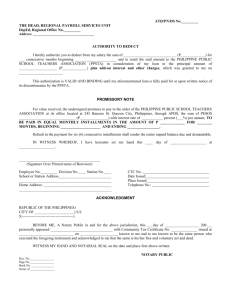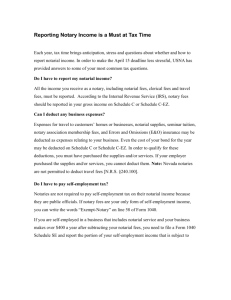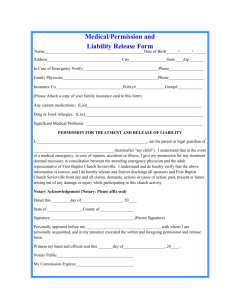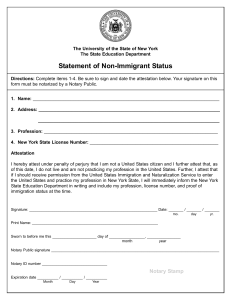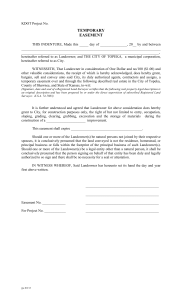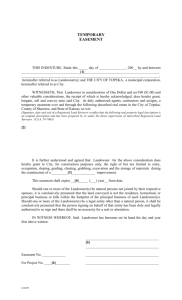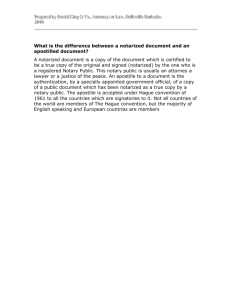Reporting Notary Income is a Must at Tax Time
advertisement
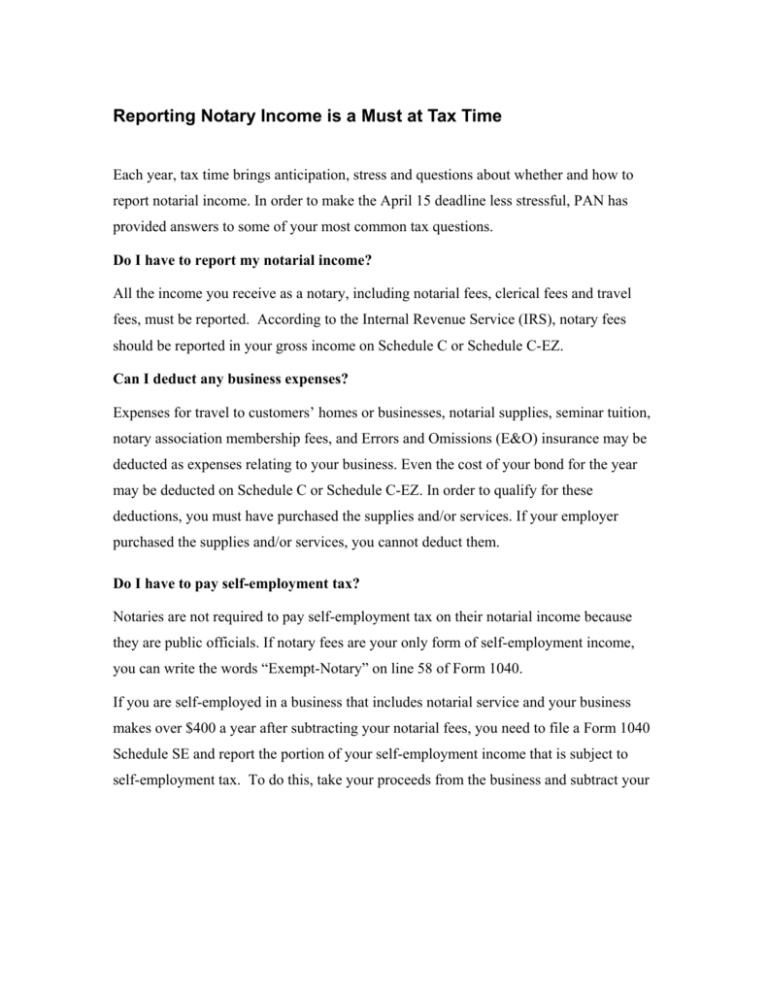
Reporting Notary Income is a Must at Tax Time Each year, tax time brings anticipation, stress and questions about whether and how to report notarial income. In order to make the April 15 deadline less stressful, PAN has provided answers to some of your most common tax questions. Do I have to report my notarial income? All the income you receive as a notary, including notarial fees, clerical fees and travel fees, must be reported. According to the Internal Revenue Service (IRS), notary fees should be reported in your gross income on Schedule C or Schedule C-EZ. Can I deduct any business expenses? Expenses for travel to customers’ homes or businesses, notarial supplies, seminar tuition, notary association membership fees, and Errors and Omissions (E&O) insurance may be deducted as expenses relating to your business. Even the cost of your bond for the year may be deducted on Schedule C or Schedule C-EZ. In order to qualify for these deductions, you must have purchased the supplies and/or services. If your employer purchased the supplies and/or services, you cannot deduct them. Do I have to pay self-employment tax? Notaries are not required to pay self-employment tax on their notarial income because they are public officials. If notary fees are your only form of self-employment income, you can write the words “Exempt-Notary” on line 58 of Form 1040. If you are self-employed in a business that includes notarial service and your business makes over $400 a year after subtracting your notarial fees, you need to file a Form 1040 Schedule SE and report the portion of your self-employment income that is subject to self-employment tax. To do this, take your proceeds from the business and subtract your notarial fees. Enter the amount of notarial fees on the dotted line to the left of Schedule SE Line 3 and write “Exempt-Notary.” Then subtract that amount from the total of Lines 1 and 2 and enter the difference on Line 3 (See Instructions for Schedule SE, Page SE-3). For example, imagine Joe is a certified public accountant (CPA). He became a notary for the benefit and convenience of his customers and opened his own business, Accounts and Acknowledgments, downtown. Joe is required to report income from both his CPA work and his notary work in his gross income. Because he owns the business, he must pay selfemployment tax on the income from the accounting business. He is not required, however, to pay self-employment tax on his notarial income. Therefore, he can deduct the notarial income on Form 1040 Schedule SE and figure his self-employment tax only on his accounting income. If you are a notary signing agent, you may also need to file a Schedule SE. See “What if I am a notary signing agent?” for more details. Is there a specified amount that I have to make in notarial income before I am required to report it? No. There is no threshold on notarial income. This means that even if you only do notarial work on the weekends for friends and neighbors and make only $20 in notarial income for the year, you must report the income on Form 1040 Schedule C or Schedule C-EZ. What if I don’t charge notary fees or am required to turn my fees over to my employer? If you do not charge notary fees, either because you choose not to charge your customers or because your employer has a no-charge policy for customers, you do not need to worry about filing tax returns for your notarial work. If, however, you charge clerical fees and/or travel fees, you must report the fees as notarial income on Form 1040 Schedule C or Schedule C-EZ. Some notaries who work in a business, such as a bank or automobile dealership, may have agreements with their employers to split the fees charged for notarial services. If you give a portion of your fees to your employer but still receive more than $600 from your share of notary fees, your employer should prepare a Form 1099MISC reporting non-employee compensation. You should still count the compensation (no matter what the amount) from customers as part of your income and report that income on Form 1040 Schedule C or Schedule C-EZ. If you are a notary signing agent, you may also receive a Form 1099MISC. See “What if I am a notary signing agent?” for more details. Are my donated notarial services tax deductible? No. Donations of service to a charitable organization, nursing home, school or any other establishment are not tax-deductible because you are not permitted to place a dollar value on your time for tax purposes. If, however, you purchase supplies, such as a seal highlighter, refill ink or pens, and use them solely for the charitable work, you may deduct the cost of the supplies under the charitable deductions section on Schedule A. You may also deduct mileage to and from the charity work at the rate of 14 cents per mile. Parking fees and tolls are also permitted as deductions on Schedule A. These itemized deductions are permitted only if you do not take the standard deduction. (See Instructions for Form 1040, Page A-4). What if I am a notary signing agent? If you are a notary signing agent, you may need to file a Schedule SE to report selfemployment tax. Because a notary signing agent receives fees in addition to his or her notary fees to compensate for time and for transporting loan packages, a notary signing agent must treat the signing agent services as a separate business that is subject to selfemployment tax. For example, imagine Mary has a full-time notary signing agent business that grossed $32,000 last year. Of that figure, $12,000 was notarial fees. She does not have to pay self-employment tax on the portion earned from notarizations. However, she does have to pay self-employment tax on the $20,000 earned from other signing agent services. Therefore, Mary would need to subtract the $12,000 in notary fees from the gross income earned by the business and report those figures on Form 1040 Schedule SE. See “Do I have to pay self-employment tax?” for more details. If you are a notary signing agent and receive more than $600 per year from any one company, that company will prepare a Form 1099MISC. You may not receive a 1099MISC from every company for which you complete loan signings; however, you are still required to report all income from loan signings on Schedule C or Schedule C-EZ. You also are required to file a Schedule SE if the signing agent portion of your business minus the notary fees makes a profit of more than $400. For More Information The information provided here is meant as a guide to aid you in preparing your federal tax forms. Please consult the laws in your state if you have questions about deducting specific notarial expenses. If you need more information on reporting taxable income, visit the IRS Web site at www.irs.gov. or consult a tax professional.
